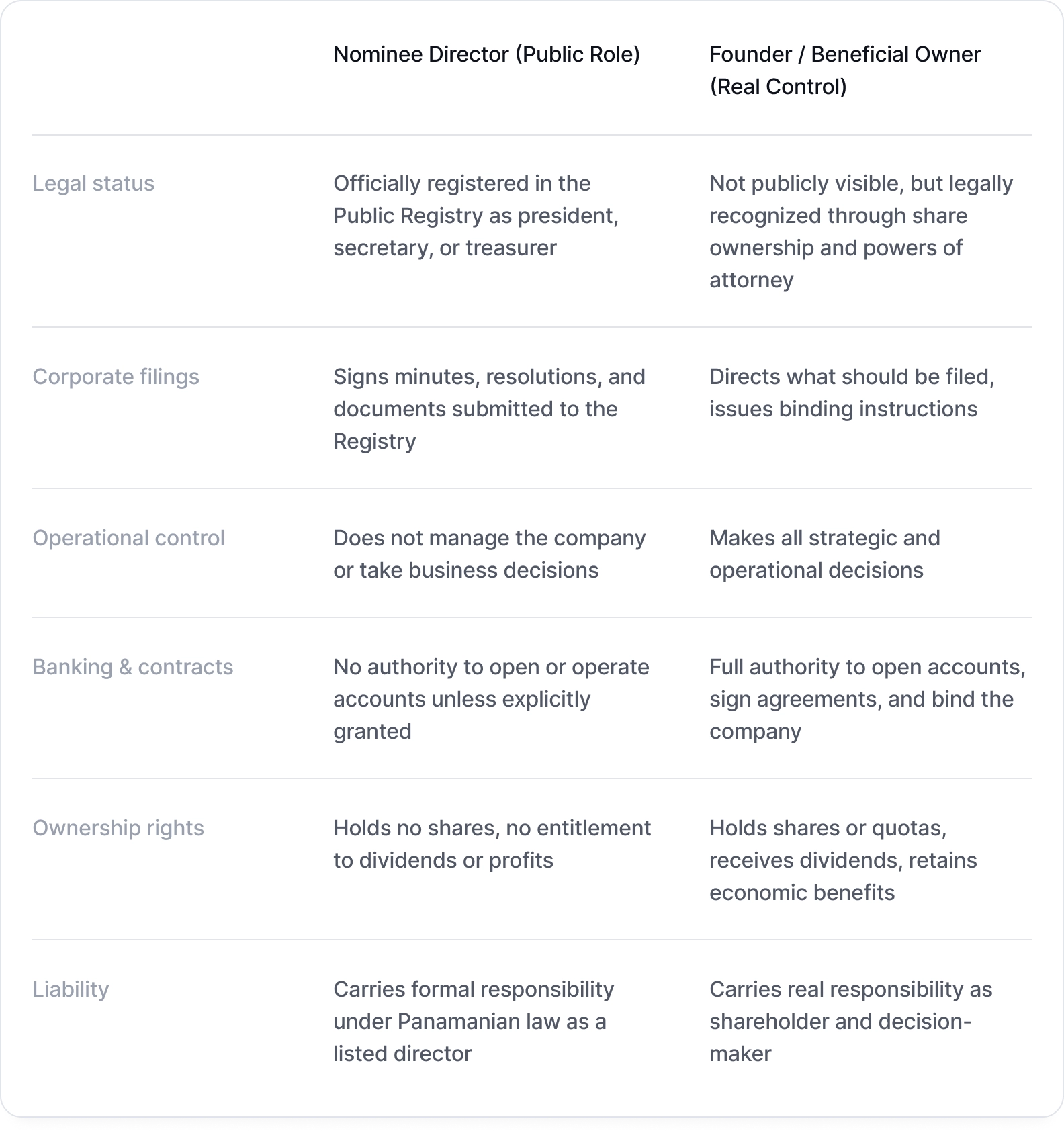
Nominee Directors in Panama: Are They Legal and Safe?
In Panama, nominee directors are a long-established and legal practice. They allow founders to comply with the three-director rule while retaining real control of the company. Understanding how they function, and where the limits lie, is essential for startups considering this structure.
Who Are Nominee Directors?
This is where nominee directors come in. A nominee director is someone (often provided by a law firm or registered agent) who is formally listed in your company’s Articles of Incorporation and in the Public Registry as president, secretary, or treasurer, but does not actually participate in managing the business. Their role is essentially to satisfy the legal framework while leaving real decision-making to the beneficial owner. Another common reason for using nominees is that Panama is an offshore jurisdiction, and some founders prefer not to make their information public.
Why Founders Use Nominee Directors
The main appeal of nominee directors lies in the combination of privacy, practicality, and speed. Having nominees allows founders to keep their own names out of the Public Registry, which can be particularly valuable for those working in sensitive industries or international markets where discretion matters. It also makes it possible to incorporate quickly without the pressure of finding three willing directors at the very start of a venture. For some, there is an additional advantage when dealing with banks, as professional nominees often already have the reputation and references needed to smooth the account-opening process.
How Nominee Directors Work
The table below highlights the distinction between the formal, public role of a nominee director and the real control exercised by the founder or beneficial owner.

Advantages vs. Risks of Using Nominee Directors
Nominee directors are not a loophole; they are a tool. They bring practical advantages, but also require careful safeguards. By thinking of nominees as a bridge: useful in early stages but less critical as the company matures, you can maximize the upside while avoiding the common pitfalls.
Fast Incorporation
Nominee directors allow you to incorporate quickly without waiting to recruit a full board of three. The risk is that if agreements are weak, nominees could technically exercise authority. To mitigate this, always prepare resignation letters and clear powers of attorney in advance.
Privacy In the Public Registry
Founders’ names remain confidential, which is especially useful in sensitive sectors. However, regulators and banks may view nominee structures as opaque. To address this, work only with reputable firms and ensure ultimate beneficial owners (UBOs) are disclosed correctly to your registered agent.
Experienced Directors
Professional nominees often have strong references and can simplify KYC procedures with banks. The trade-off is that some banks may still flag nominee-heavy companies for additional checks. A solution is to combine nominees with at least one real director as the company grows.
Flexibility for Early Stage
For startups with only one or two founders, nominees make it possible to meet Panama’s legal requirements. The downside is that annual fees for nominees increase operating costs. Founders should plan ahead by budgeting for nominee services as part of compliance expenses.
Continuity
Nominee firms ensure the board remains complete if someone resigns. But if nominees are unresponsive, regulatory filings can be delayed. This risk is best managed by choosing firms that guarantee prompt replacement of nominees.
Final Thoughts
Nominee directors are both legal and common in Panama, and for many startups they provide an elegant solution to a practical problem. They allow a company to meet its statutory obligations without slowing down incorporation, while giving founders the privacy they often seek. But they should always be treated as a tool, not a loophole.












